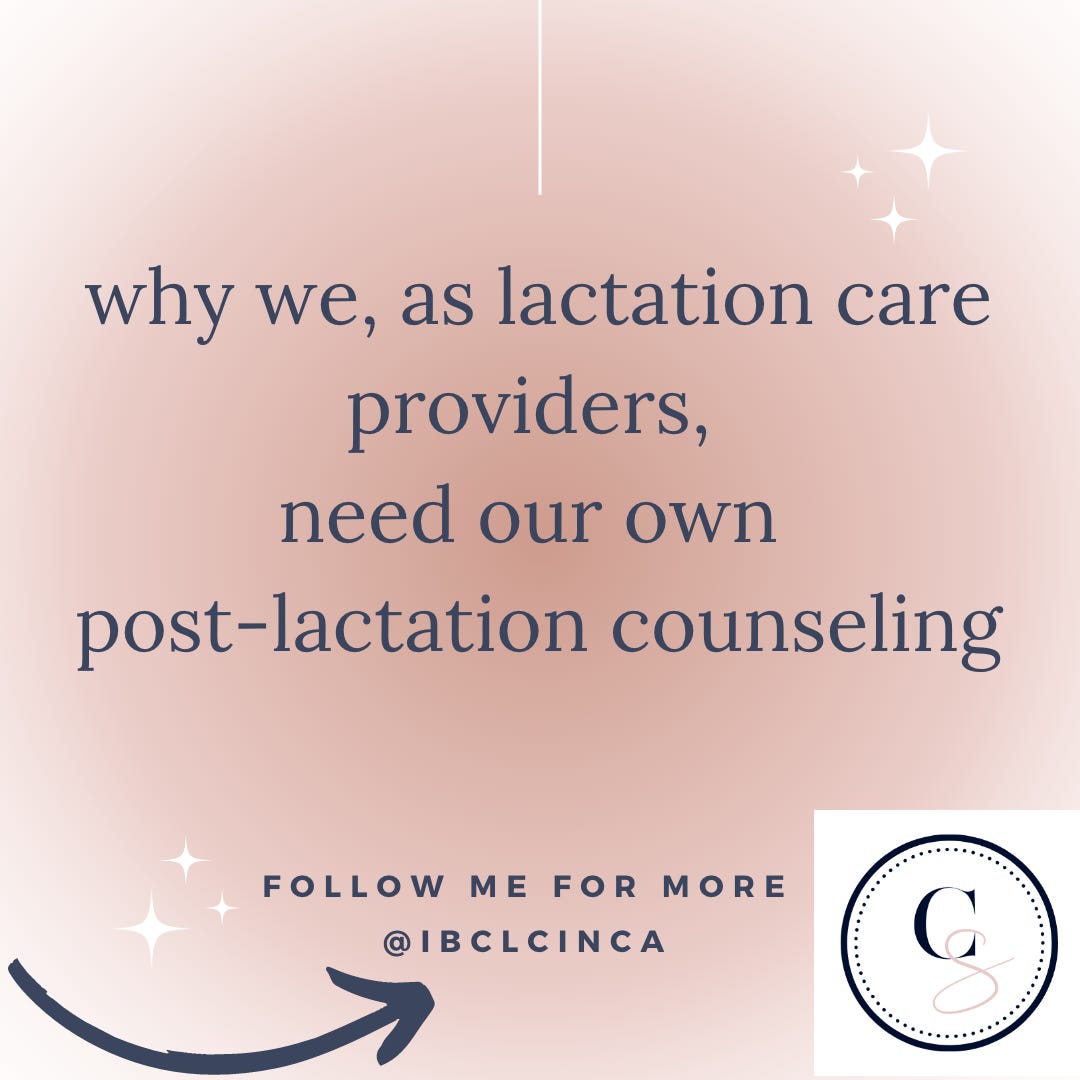why we, ourselves, need post-lactation counseling
especially when we are working in the lactation & birth worlds
It was with our second cohort of teaching future lactation educators that my colleague and I realized that some of our students needed more than just knowledge and information. They were in tears as they absorbed the information about how human lactation works and best practices. Some were angry, too, that they were given bad information when they were trying to breastfeed. They followed us into the restroom to talk about their personal journeys, they sat with us at lunch and let their stories unfold, and they bonded together over what they had experienced.
These folks, themselves, needed post-lactation counseling. They needed help understanding what had happened, a chance to think it all through without the fog of being a new parent, an IBCLC to help them re-frame their story into something they could use as a teaching tool and a springboard for motivation.
Aspiring lactation consultants are not required to undergo any type of formal or informal debriefing process about their own lactation and birth experiences. Considering that these are some of the most transformative experiences of one’s life, this is surprising and disheartening.
Years ago, when I first learned from a licensed medical social worker about the debriefing process she underwent in her professional training, I immediately wondered why this was not a standard part of the process of becoming a clinical lactation care provider.
Some of us had the opportunity during our mentorship to participate in conversations and/or deliberate opportunities to discuss and process our lactation and birth journeys. However, without a requirement to make sure this happens somewhere along the way, new IBCLCs are minted every year who could be unknowingly bringing their distress, trauma, and grief over their own personal experiences into their work helping others.
What’s important to understand about that is this: not only can that potentially impact the lactation care being provided to clients, it can also potentially make the work of lactation care more difficult and for some lactation care providers, unsustainable in the long-term.
I am really focused on making the work of lactation care fulfilling and sustainable. I want to see the brilliant people who are working so hard in this field have a clearly defined personal mission, all the tools they need to do the work, and the resilience they will rely on over the years. I do not want to see us losing people because they burn out early, feel undervalued, and get frustrated at their perceived lack of impact.
That’s why I care about folks having the opportunity to do some self-reflection about their own experiences and how they are impacting their work.
At its core, this is about offering lactation and birth workers a guided plan for examining their own birth and lactation journeys, the stories they have told themselves and others, and the ideals that guide their work. With that self-reflection, they can then begin to see if there are places where their own experiences are leaking through in the care they give.
Consider this: of all the angry, tearful, and frankly sad stories we see new parents sharing on social media when we bring up childbirth and breastfeeding, some of those folks are going to be inspired enough, mad enough, courageous enough to enter into this arena of care. But there’s no built-in place where they will get to process their own baggage as they get educated.
They may learn the facts and the science of human birth and lactation, but they won’t by default be given the chance to unpack their own experiences. Unfortunately, that is likely to impact their counseling abilities as well as their own job satisfaction.
For now, let’s start with this: I shared above that I really want to help you grow and thrive in your lactation career by building resilience.
I’d love to see your completed worksheets and start a conversation about your mission! You can DM me on Instagram @IBCLCinCA or email me at Christine@EvolveLactation.org.





Many years ago when I was taking the didactic 40hr course taught by Gini Baker, I noticed this phenomenon - during the class, the hands raised were not comments or questions on the course content, but people grieving their own difficult experiences. I went up to Gini during a break and asked her if this was unique to this particular class and she said "Oooooh no. Everytime I teach a class, first, I gotta heal the room" and she waved her hand in a circle as if she were creating a charm to heal. Never forgot it.
I used to be a Nurse-Family Partnership home visitor and we did regular "reflective supervision" with our director. It was basically a counseling session where we could talk about our clients' struggles and how we were affected or triggered personally by being part of their lives. I'd love to see it implemented in lactation mentorships and clinics!